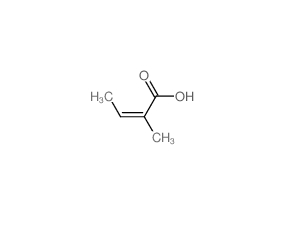
Angelic Acid
CAS No. 565-63-9
Angelic Acid( —— )
Catalog No. M18821 CAS No. 565-63-9
Angelic acid is a monocarboxylic unsaturated organic acid. Angelic acid esters are the active components of herbal medicine used against a wide range of various health disturbances including pains, fever, gout, heartburn, etc.
Purity : >98% (HPLC)
 COA
COA
 Datasheet
Datasheet
 HNMR
HNMR
 HPLC
HPLC
 MSDS
MSDS
 Handing Instructions
Handing Instructions
| Size | Price / USD | Stock | Quantity |
| 10MG | 49 | In Stock |


|
| 25MG | 76 | In Stock |


|
| 50MG | 110 | In Stock |


|
| 100MG | Get Quote | In Stock |


|
| 200MG | Get Quote | In Stock |


|
| 500MG | Get Quote | In Stock |


|
| 1G | Get Quote | In Stock |


|
Biological Information
-
Product NameAngelic Acid
-
NoteResearch use only, not for human use.
-
Brief DescriptionAngelic acid is a monocarboxylic unsaturated organic acid. Angelic acid esters are the active components of herbal medicine used against a wide range of various health disturbances including pains, fever, gout, heartburn, etc.
-
DescriptionAngelic acid is a monocarboxylic unsaturated organic acid. Angelic acid esters are the active components of herbal medicine used against a wide range of various health disturbances including pains, fever, gout, heartburn, etc.
-
In Vitro——
-
In Vivo——
-
Synonyms——
-
PathwayOthers
-
TargetOther Targets
-
RecptorOthers
-
Research Area——
-
Indication——
Chemical Information
-
CAS Number565-63-9
-
Formula Weight100.12
-
Molecular FormulaC5H8O2
-
Purity>98% (HPLC)
-
SolubilityIn Vitro:?DMSO : 250 mg/mL (2497.00 mM)
-
SMILESC/C=C(/C)\C(=O)O
-
Chemical Name——
Shipping & Storage Information
-
Storage(-20℃)
-
ShippingWith Ice Pack
-
Stability≥ 2 years
Reference
1. Ernest Small?Culinary herbs, National Research Council Canada, 2006, p. 288
molnova catalog



related products
-
Adamantanine
Adamantanine is an amino acid transport inhibitor.
-
trans-2,3,4-Trimetho...
trans-2,3,4-Trimethoxycinnamic acid is a natural product for research related to life sciences.
-
BC-1382
BC-1382 is a potent ubiquitin E3 ligase HECTD2 inhibitor that specificly disrupts the HECTD2/PIAS1 interaction(IC50 of 5 nM).BC-1382, that targeted HECTD2 and attenuated lipopolysaccharide (LPS)- and Pseudomonas aeruginosa-induced lung inflammation.?



 Cart
Cart
 sales@molnova.com
sales@molnova.com


